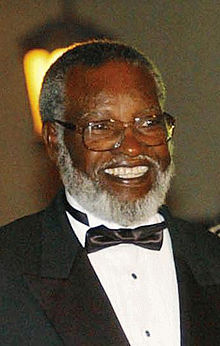Sam Nujoma
| Sam Nujoma | |
|---|---|

Nujoma in 2003
|
|
| 1st President of Namibia | |
|
In office 21 March 1990 – 21 March 2005 |
|
| Prime Minister |
Hage Geingob (1990–2002) Theo-Ben Gurirab (2002–2005) |
| Preceded by | office established |
| Succeeded by | Hifikepunye Pohamba |
| President of SWAPO | |
|
In office 19 April 1960 – 29 November 2007 |
|
| Preceded by | office established |
| Succeeded by | Hifikepunye Pohamba |
| President of OPO | |
|
In office 19 April 1959 – 19 April 1960 |
|
| Preceded by | office established |
| Personal details | |
| Born |
12 May 1929 Ongandjera, Ovamboland, South West Africa (now Okahao, Namibia) |
| Political party | SWAPO, OPO |
| Spouse(s) |
Kovambo Theopoldine Nujoma (m. 1956) |
| Children |
Utoni Nujoma John Ndeshipanda Sakaria Nefungo Nelago Usuta |
| Alma mater | University of Namibia |
| Religion | Lutheran |
| Website | www.samnujomafoundation.org |
|
|
Samuel "Shafiishuna" Nujoma, (/nuːˈjoʊmə/; born 12 May 1929) is a Namibian revolutionary, anti-apartheid activist and politician who served three terms as the first President of Namibia, from 1990 to 2005. Nujoma was a founding member and the first president of the South West Africa People's Organization (SWAPO) in 1960. He played an important role as leader of the national liberation movement in campaigning for Namibia's independence from South African rule. He established the People's Liberation Army of Namibia (PLAN) in 1962 and launched a guerrilla war against the apartheid government of South Africa in 1966, beginning after the United Nations withdrew the mandate for South Africa to govern the territory. Nujoma led SWAPO during the lengthy Namibian War of Independence, which lasted from 1966 to 1989.
During World War I, South Africa defeated the German colonial forces in South West Africa and established martial law in the colony after making a peace treaty in July 1915. After the war, the League of Nations officially assigned the former German colony, to the United Kingdom as a mandate under the administration of South Africa. When the National Party won the 1948 election in South Africa, it passed laws establishing racial segregation known as apartheid. It applied these laws to Southwest Africa as well, which it governed as the de facto fifth province of South Africa. Apartheid created strict racial classifications and reduced the rights of natives, particularly.
...
Wikipedia
